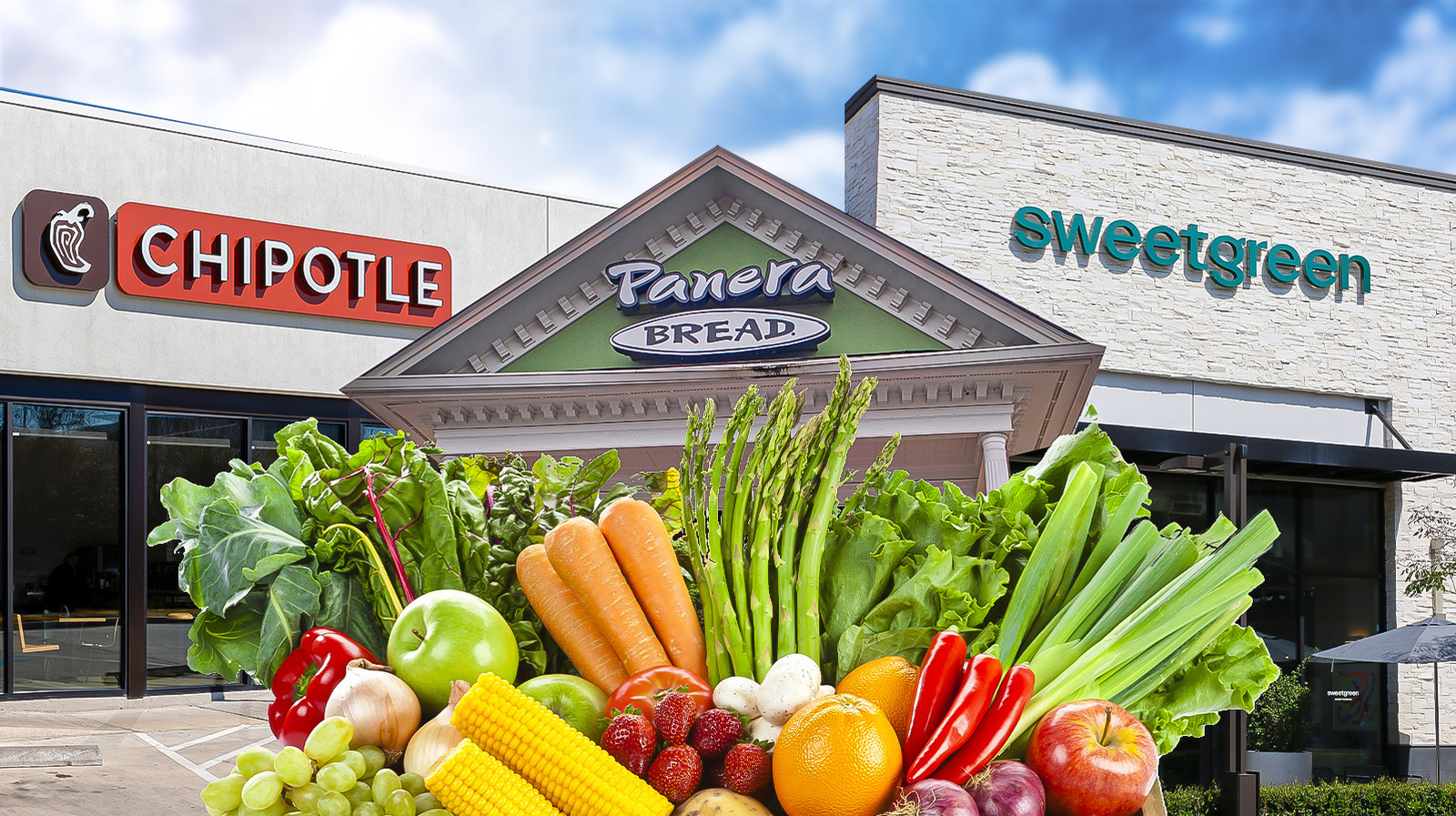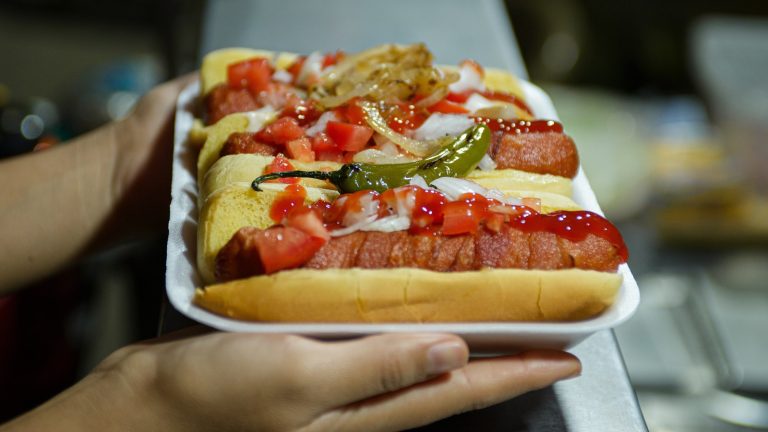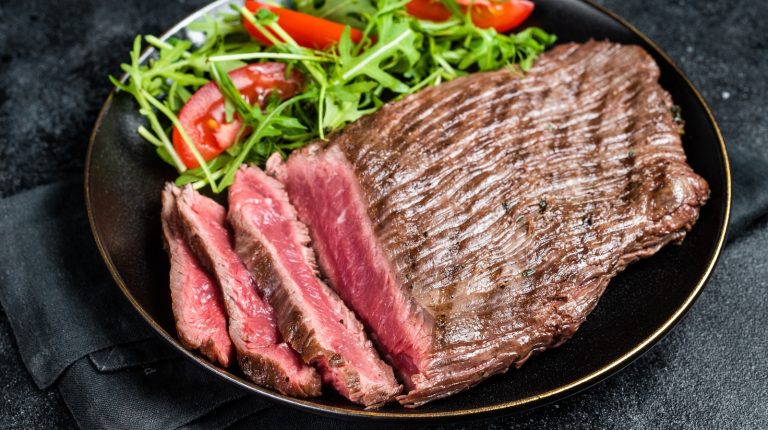The demand for organic food has surged in recent years as diners choose to prioritize health, sustainability, and high-quality ingredients. No longer limited to niche establishments, organic options are now being embraced by larger restaurant chains, making it easier for consumers to access fresh, nutritious meals. From fast-casual dining spots to upscale cafés, these chains are leading the charge by sourcing organic ingredients, supporting sustainable practices, and offering greater transparency in food sourcing.
In this article, we focus on 15 U.S. restaurant chains that have integrated organic ingredients into their menus. While some chains are fully committed to using organic produce and proteins, others offer organic items as part of their broader mission to provide healthier and more environmentally friendly dining options. These chains cater to a variety of tastes and preferences, whether you’re craving a plant-based burger, a fresh, vibrant salad, or a nutrient-packed smoothie. Each chain represents a different approach to sustainable dining, from fully organic menus to curated organic selections that contribute to a more conscious dining experience.
Chipotle
Chipotle has established itself as a leader in the fast-casual dining industry by prioritizing sustainability and ethical sourcing through its “Food with Integrity” initiative. Since its opening in 1993, the chain has emphasized serving fresh, responsibly sourced ingredients prepared with traditional cooking techniques. While not entirely organic, Chipotle incorporates organic beans into its menu items and sources meats from animals raised without added hormones or antibiotics. Its beef, for example, is traceable back to the ranch of origin, with cuts like sirloin and top round featured prominently in their menu, while the pork comes from pigs raised outdoors or in bedded barns, and dairy is sourced from pasture-raised cows when weather permits.
These standards are upheld through third-party audits to ensure compliance. This commitment ensures that even if all ingredients are not USDA-certified organic, they are at least responsibly sourced. Chipotle also works to minimize its environmental footprint. The company has committed to reducing greenhouse gas emissions by 50% by 2030, aligning with the Paris Agreement’s climate goals.
Sweetgreen
Sweetgreen specializes in salads and bowls, highlighting locally sourced, organic ingredients. By partnering with farmers, Sweetgreen ensures fresh, high-quality produce, prioritizing organic greens and grains. Their mission is to build healthier communities by connecting people to real food while fostering a more sustainable food system. With a plant-forward menu that is, on average, 30% less carbon-intensive than the typical American meal, Sweetgreen says it is working toward becoming carbon neutral by 2027. The company also says they are dedicated to regenerative farming practices, carbon minimization strategies, and carbon assessments for its menu items, analyzing the environmental impact of food production at every stage. This data informs their menu decisions, ensuring continuous improvement in sustainability.
Sweetgreen adopted the Better Chicken Commitment in 2018 to address welfare issues like living conditions, stocking density, and humane slaughter. By 2026, Sweetgreen plans to ensure that at least 75% of the chicken it uses comes from farms that meet specific animal welfare standards set by the Global Animal Partnership (GAP), and they aim to reach 100% by 2027. These standards include better living conditions and more space for the chickens. They also want to start using breeds of chickens that grow more naturally and are healthier rather than relying on the fast-growing breeds commonly used in the industry. Sweetgreen’s commitment extends to its new steak offerings, which have become a popular addition to its menu and come from grass-fed, pasture-raised tri-tip sirloin.
True Food Kitchen
True Food Kitchen, founded in Phoenix in 2008, emphasizes a menu inspired by an anti-inflammatory diet. With a focus on seasonal and nutrient-dense ingredients, the chain says it is committed to promoting health-conscious dining without compromising flavor. A significant portion of its produce is organically sourced, with a priority on items at higher risk of contamination. This aligns with the Environmental Working Group’s “Dirty Dozen” guidelines: a list of fruits and vegetables most likely to carry pesticide residues that can pose health risks. The restaurant has also eliminated seed oils from its cooking, opting instead for olive and avocado oils to enhance both the nutritional value and taste of its dishes. True Food Kitchen also avoids additives, such as artificial food coloring, high-fructose corn syrup, and synthetic preservatives.
The brand, which has 45 locations across 17 states, is also advancing efforts in regenerative farming, partnering with growers to support soil health, animal welfare, and fair labor practices. Currently, ingredients like bison, quinoa, and rice meet these standards, with plans to expand this approach further. True Food Kitchen’s animal proteins are hormone and antibiotic-free, with organic, grass-fed beef, pasture-raised eggs, and regenerative organic bison featured prominently on the menu.
Dig
Dig is a fast-casual restaurant chain focused on seasonal, farm-to-table meals, prioritizing organic and sustainably sourced ingredients. The chain says it steers clear of hydrogenated fats, artificial colorings, high fructose corn syrup, and added artificial sweeteners. Dig chooses ingredients with short shelf lives to avoid the need for chemical preservatives, ensuring that only fresh, safe food makes it to the plate. The company also says it maintains direct relationships with farmers, allowing them to monitor production methods closely and ensure that ingredients meet their standards for both flavor and sustainability.
Dig also strives to make its meals reasonably priced while maintaining high-quality ingredients. By focusing on mindfully sourced ingredients, the restaurant balances affordability with the higher costs of organic, sustainably grown food, aiming to make nutritious meals accessible without inflating prices for marketing purposes. To accommodate various dietary needs, Dig offers a catering menu that clearly labels common allergens and vegan-friendly dishes and their build-your-own-bowl approach also makes them keto-friendly.
Panera Bread
Panera Bread has taken steps to reduce artificial additives in its menu, reflected in its “No No List,” which identifies ingredients excluded from its U.S. café menus and grocery products. These include artificial preservatives, sweeteners, flavors, and colors, as well as items like high-fructose corn syrup, trans fats, and artificial dyes. The initiative aims to align with the growing consumer demand for more natural food options.
While Panera’s menu is not fully organic, some key items, such as salads and breads, include organic ingredients. These changes are part of the company’s effort to embrace sustainability and increase transparency in food sourcing. Panera has also extended its focus on sustainability to its coffee offerings. Sourced from farms around the world, their coffee program emphasizes ethical practices and quality. Seasonal menu items, like the popular Autumn Squash Soup, further underscore Panera’s approach to using fresh, high-quality ingredients.
Tender Greens
Tender Greens is a farm-to-table restaurant chain that emphasizes organic, locally sourced ingredients and sustainable practices. Founded in 2006 in Culver City, California, the chain has expanded to 22 locations, each led by an executive chef. The menu at Tender Greens features a range of healthy options, including organic salads, free-range meats, and responsibly sourced seafood. The company prioritizes partnerships with farmers and suppliers who meet their high standards for ethical and sustainable food production. Their produce is grown using organic and natural methods that support soil health and biodiversity, though the company emphasizes that quality often extends beyond the “organic” label.
The chain says it carefully considers the environmental and social impact of its ingredients, including the use of non-GMO expeller-pressed canola oil for grilling, chosen for its neutral flavor and higher smoke point. Seafood is sourced from certified responsible fisheries, while meats are free-range. While many dishes at Tender Greens are gluten-free, the company is transparent about the possibility of cross-contamination.
Clean Juice
Clean Juice, a USDA-certified organic juice bar franchise, is known for its commitment to providing organic ingredients in a variety of offerings, including smoothies, cold-pressed juices, açaí bowls, salads, wraps, and sandwiches. Founded in 2016, Clean Juice positions itself as the first franchise of its kind in the United States to hold USDA organic certification, ensuring transparency and adherence to organic farming and food preparation standards.
Organic certification means that Clean Juice’s ingredients are free from synthetic pesticides, harmful chemicals, GMOs, and artificial additives. Organic farming methods avoid synthetic fertilizers and pesticides, instead relying on crop rotation, intercropping, and natural pest deterrents to maintain soil health and biodiversity. These practices not only enhance the nutrient content of crops but also reduce environmental contamination. Operating over 70 locations across 19 states, Clean Juice markets the health benefits of its organic products which include potentially lower exposure to pesticides and heavy metals like cadmium and higher levels of antioxidants.
Bareburger
Bareburger is a fast-casual chain known for its focus on organic and sustainable dining. Since its founding in 2009, the restaurant has aimed to provide options for different dietary needs, offering everything from organic beef and chicken burgers to plant-based patties like the Impossible Burger and vegan-friendly menu items. For those avoiding gluten, Bareburger also serves gluten-free alternatives.
The chain emphasizes sustainability throughout its operations, partnering with suppliers who prioritize eco-friendly practices. Their beef burgers, for instance, feature a blend of organic brisket, chuck, and short rib sourced from grass-fed, hormone and antibiotic-free cattle. The restaurant also offers vegetarian or vegan options like the My Sunshine burger, which is made from sweet potato, kale, and wild rice, or the cilantro black bean burger. The Impossible Shrooming, featuring mushrooms and a jalapeño barbecue sauce, is another standout for those seeking bold flavors. The restaurant’s beverages are also free from artificial additives, colors, and sweeteners.
Salad and Go
Salad and Go is a drive-thru chain offering healthy, affordable meals for diners seeking quick and nutritious options. With a focus on fresh, whole ingredients, many of their salads and soups include organic components, ensuring balanced and flavorful meals that are accessible to a wide audience. The menu features hearty salads served in 48-ounce bowls, designed to provide a balanced mix of vegetables, proteins, and healthy fats. Customers can customize their orders, swapping ingredients or adjusting greens to suit their preferences. For added variety, chef-designed salads come paired with gluten-friendly dressings, though the chain notes that cross-contact with gluten is possible in its kitchens.
Beyond salads, Salad and Go offers breakfast bowls and wraps, ensuring healthy options are available throughout the day. While the emphasis is on convenience, the chain says it applies strict safety standards to every step of the process. For diners on the go, the chain provides a quick, satisfying alternative to traditional fast food, making healthy eating both convenient and affordable with customizable options.
Just Salad
Just Salad is a fast-casual restaurant chain focused on sustainability and plant-forward dining. Its menu features a variety of salads, wraps, warm bowls, soups, and smoothies, all made with fresh ingredients prepared daily. The chain has implemented eco-friendly initiatives, such as a reusable bowl program and the exclusion of beef from its menu. It offers plant-based options like Beyond Chicken and vegan cheese, along with sustainably sourced ingredients such as Regenerative Organic Certified quinoa and chickpeas. However, not all of its produce is organic.
In a move toward transparency, Just Salad was the first U.S. restaurant chain to include carbon labeling on its menu. These labels provide information on the greenhouse gas emissions associated with each dish, measured from production to disposal. Customers can also offset the carbon footprint of their meals through a program integrated into the chain’s mobile app. With over 80 locations across the United States, Just Salad has initiatives, including carbon-conscious menus and partnerships with suppliers focused on regenerative farming.
Modern Market Eatery
Modern Market Eatery is a fast-casual chain specializing in scratch-made meals crafted with fresh, whole, and sustainable ingredients. Known for its emphasis on healthy and affordable dining, the restaurant incorporates organic and locally sourced products when possible, avoiding artificial additives, trans fats, hormones, and antibiotics. Signature menu items, including salads, pizzas, and protein-focused dishes, reflect the chain’s commitment to using organic ingredients, such as organic flour, in its pizza crusts.
Inspired by farmers’ markets, Modern Market’s offerings balance comfort foods with globally influenced flavors and cater to a range of diets. The menu also allows for customization, which allows diners to align their meals with their preferences, including an emphasis on minimally processed or organic foods. In addition to its in-restaurant dining options, Modern Market offers catering services for events, providing dishes made from seasonal ingredients.
Veggie Grill
Veggie Grill, a plant-based restaurant chain, offers dishes designed to align with a vegan lifestyle while incorporating organic and sustainably sourced ingredients. Acquired in 2024 by Next Level Burger, Veggie Grill is now part of the largest wholly owned plant-based restaurant company in North America.
Founded in 2006, Veggie Grill focuses on providing wholesome, plant-based alternatives to traditional meals, catering to a variety of dietary preferences. Its menu includes bowls, salads, sandwiches, and burgers, many of which feature organic produce. The chain’s emphasis on transparency ensures that guests with dietary restrictions can easily identify allergens, protein content, and calorie counts in each dish. While Veggie Grill is not exclusively organic, the chain prioritizes the use of organic fruits and vegetables and responsibly sourced ingredients whenever possible.
Cava
Cava, a Mediterranean-inspired fast-casual chain, has built its reputation by offering customizable bowls, pitas, and salads crafted from high-quality ingredients, including organic produce. The founders of Cava, Ike Grigoropoulos, Chef Dimitri Moshovitis, and Ted Xenohristos, drew inspiration from their Mediterranean heritage and wanted to bring this tradition into a modern, accessible, fast-casual dining experience when they opened Cava in 2010.
While not all ingredients are organic, Cava says it is committed to working with suppliers who align with values of sustainability and responsible sourcing. For example, the chickpeas used in its hummus, and the Fair Trade Certified sugar in its fountain sodas and prioritizes plant-based options, offering seasonal promotions. The company also works closely with dairy farmers who don’t treat cows with rbST (recombinant bovine somatotropin), a hormone commonly used to boost milk production. Cava also works with growers and ranchers who adhere to animal welfare and environmental sustainability practices.
Bluestone Lane
Bluestone Lane, an Australian-inspired café chain, incorporates organic ingredients into its menu, though the extent of its use varies. The chain emphasizes wellness and sustainability in its offerings, featuring organic and locally sourced options where possible. While not all ingredients are organic, Bluestone Lane prioritizes fresh, high-quality produce for its meals, including seasonal dishes that align with its commitment to health-conscious eating. The menu includes items like toasts, bowls, and specialty drinks, some of which feature organic ingredients.
Bluestone Lane sources its coffee from sustainably farmed, ethically traded beans, working directly with coffee farmers across South America, Africa, and Asia. The coffee is roasted at Bluestone Lane’s Brooklyn roastery and sealed immediately after roasting with food-grade nitrogen to preserve its freshness. The chain also ensures that its coffee packaging is recyclable, resealable, and environmentally friendly. Their cafés also serve signature cold-pressed juices and organic teas.
Flower Child
With locations in 14 states, Flower Child focuses its menu around vegetarian, vegan, gluten-free, and paleo diets. The restaurant uses organic ingredients in some dishes, like salads and grain bowls, but not all produce is organic due to availability and cost. Local farmers and suppliers help supply the fresh ingredients used to make the meals.
The menu allows customers to adjust dishes to match their preferences. Popular meals include the Mother Earth Bowl with grains, sweet potato, avocado, and charred onion, and the gluten-free Mac & Cheese made with aged white cheddar and parmesan. Flower Child also offers catering for events, bringing fresh dishes to gatherings. The restaurant works to reduce its environmental impact by cutting down on food waste and using eco-friendly packaging.




